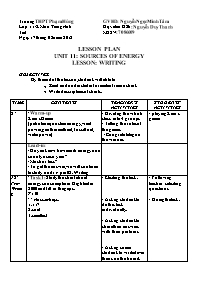Lesson plan - Unit 11: Sources of energy - Lesson: Writing

OBJECTIVES:
By the end of the lesson, students will able to:
• Read and understand information from a chart.
• Write descriptions of charts.
Bạn đang xem tài liệu "Lesson plan - Unit 11: Sources of energy - Lesson: Writing", để tải tài liệu gốc về máy bạn click vào nút DOWNLOAD ở trên
Trường: THPT Phạm Hùng GVHD: Nguyễn Ngọc Minh Tâm Lớp: 11/2. Môn: Tiếng Anh Họ và tên GSh: Nguyễn Duy Thanh Tiết: MSSV: 7086609 Ngày 17 tháng 02 năm 2012 LESSON PLAN UNIT 11: SOURCES OF ENERGY LESSON: WRITING OBJECTIVES: By the end of the lesson, students will able to: Read and understand information from a chart. Write descriptions of charts. TIME CONTENTS TEACHER’S ACTIVITIES STUDENTS’ ACTIVITIES 5’ *Warm-up Kim’s Game ( petroleum, nuclear energy, wind power, geothermal heat, fossil fuel, water power) - Dividing the whole class into 4 groups. - Telling the rules of the game. - Congratulating on the winner. - playing Kim’s game Lead-in: - Do you know how much energy one country uses a year? - Much or less? - To get the answer, we will continue to study unit 11- part D. Writing 15’ Pre- Writing *Task 1: Study the chart about energy consumption in Highland in 2000 and fill in the gaps. P 130 ** Answer keys: 1. 117 2. coal 3. smallest * Task 2: Study the chart again and fill in the gaps. The chart describes the energy consumption in Highland in 2005. As can be seen, the total energy consumption was (1) million tons. (2). made up the largest amount of the figure (75 million tons). This was followed by the consumption of (3) . (50 million tons). Coal made up the (4) amount of energy consumption (45 million tons). ** Answer keys: 1. 170 2. Nuclear & Hydroelectricity 3. Petroleum 4.smallest * Task 3: Work in groups of four to answer the following questions: 1. The total energy consumption in 2000 was higher or lower than it was in 2005? 2. The energy consumption increased or decreased in 2005? 3. Which made up the largest amount of energy consumption in 2000? 4. Did it still make up the largest amount of energy consumption in 2005? 5. Which made up the smallest amount of energy consumption in 2000? ** Answer keys: The total energy consumption in 2000 was lower than it was in 2005. The energy consumption decreased in 2005. Petroleum made up the largest amount of energy consumption in 2000. No. Nuclear & Hydroelectricity made up the largest amount in 2005. Nuclear & Hydroelectricity made up the smallest amount of this figure in 2000. *** Useful structures Past simple tenses The chart shows/ describes The total energy consumption was (To) make up the largest/ smallest amount of The energy consumption increased/ decreased in - Eliciting the task. - Asking students to do this task individually. - Asking students to share their answers with their partners. - Asking some students to write down theirs on the board. - Correcting students’ answers. - Asking students to move to task 2. - Eliciting the task. - Asking students to work in pairs to finish the task. - Asking students to write their answers on the board. - Correcting the task. - Eliciting the task - Asking students to work in groups of 4 - Asking students to discuss and answer the questions. - Eliciting the useful structures. - Asking students to copy down these structures. - Following teacher’s eliciting questions. - Doing the task. - Following teacher’s eliciting questions. - Doing the task. - Following teacher’s eliciting questions. - Working in groups. - Discussing and answering the questions. - Following teacher’s eliciting questions. - Copying the structures. 10’ While- writing * Task 4: Describe the chart, using the information from task1 and task 2. P. 130 Suggested description The chart indicates the energy consumption in Highland in 2000 and 2005. As can be seen, the total energy consumption in 2005 was 170 million tons. It was higher than it was in 2000 (117 million tons). Petroleum made up the largest amount of energy consumption in 2000; however, Nuclear & Hydroelectricity made up the largest amount in 2005. Besides, coal decreased the amount of the energy consumption (from 57 million tons in 2000 to 50 million tons). - Eliciting the task. - Asking students to work in individuals - Following teacher’s eliciting questions. - Doing the task. 10’ Post- Writi ng * Correction - Passing the guidelines for correction out. - Eliciting the guidelines. - Asking students to exchange their paper to correct. - Getting the guidelines. - Following teacher’s eliciting questions. - Correcting together. Homework Reviewing the useful structures. Comparing your descriptions with the suggested description. - Asking students to review the lesson and compare their descriptions with the suggested description - Taking notes Duyệt của GVHDCM Long Hồ, ngày 8 tháng 02 năm 2012 Người soạn Nguyễn Ngọc Minh Tâm Nguyễn Duy Thanh Guidelines for correction Put a tick (ü) on the right column Yes no Tenses used in the paper (past simple). Information on the total energy consumption. Information on the kinds of energy made up the smallest/largest amount of energy consumption. Comparison energy consumption in 2000 and 2005. Mis-spelling. Punctuation.
Tài liệu đính kèm:
 giao an u 11 writing sua 143.doc
giao an u 11 writing sua 143.doc





